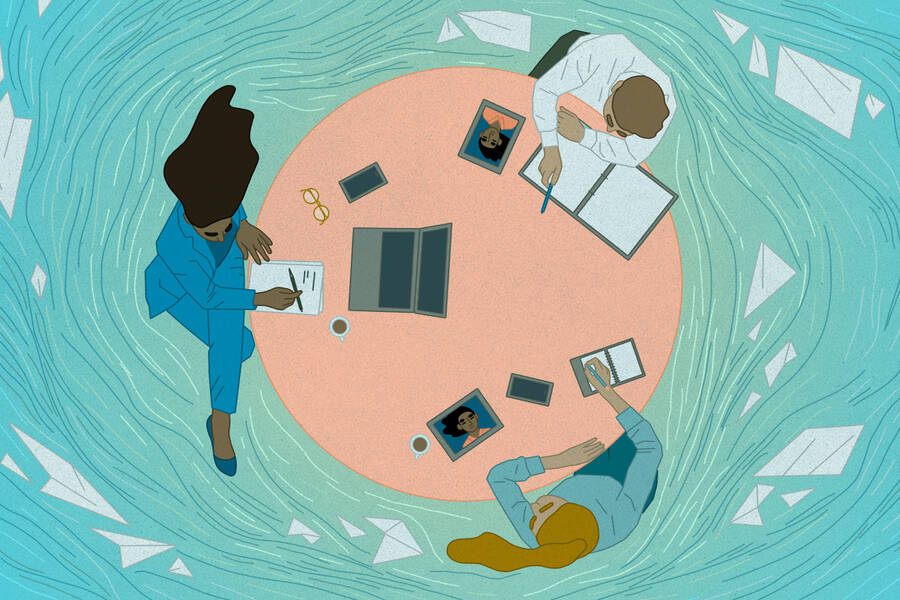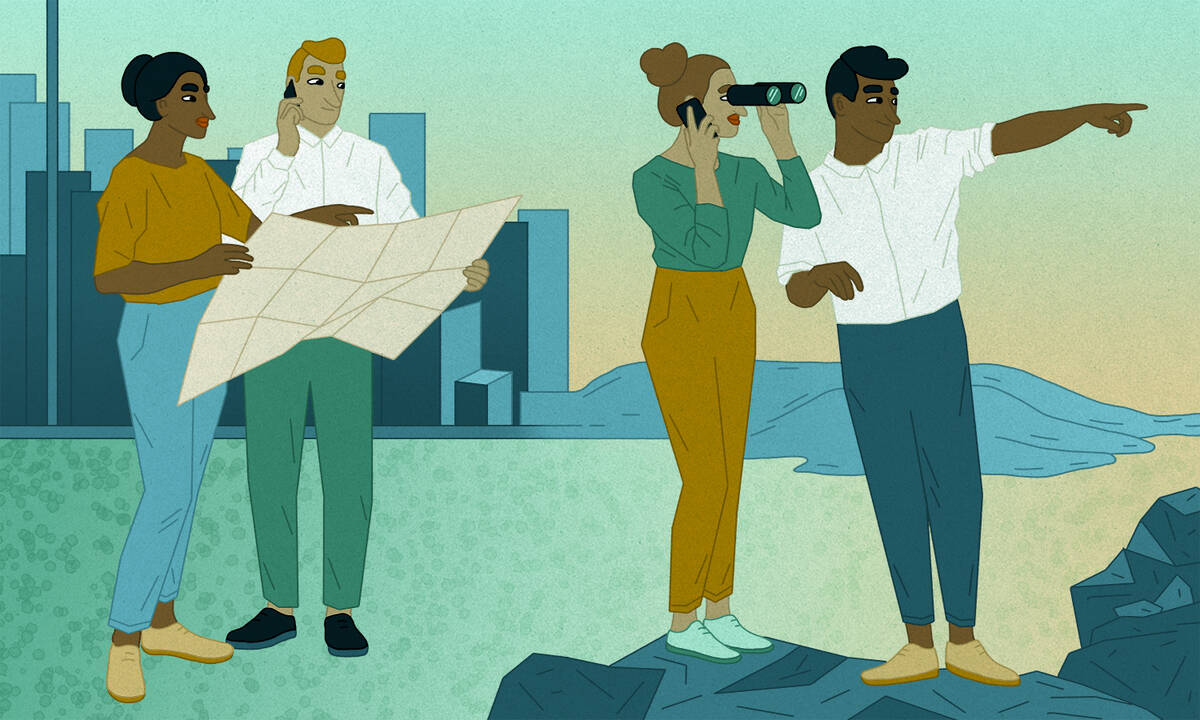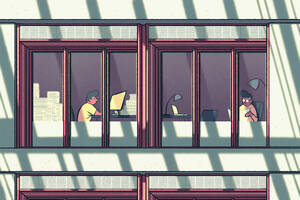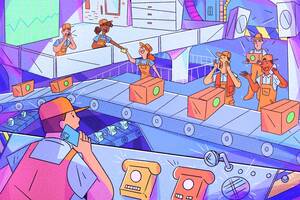
Apr 2, 2020
The Latest: Our Faculty on the Coronavirus, Business, and the Economy
Finding a job during a pandemic. Plus, the fate of the 1918 “flu babies.”

Lisa Röper
The COVID-19 global health pandemic has quickly and drastically changed how businesses operate—even whether they can operate at all.
As events unfold, Kellogg faculty are weighing in on the challenges facing organizations and individuals, and we’re keeping tabs on what they have to say. We are updating this page to share new information as it is published around the web.
Will the Gloom of 2020 Lead to a Better and Brighter 2021?
Paul Earle, adjunct lecturer of innovation and entrepreneurship, thinks so. Citing the “groovy adjacencies” to past periods of struggle (e.g., the Roaring Twenties as a response to the 1918–19 pandemic), he’s looking ahead to the middle of next year for innovation and growth. He sees a future of new partnerships, a new focus on sustainability and social justice, and new initiatives built on simply making people happy. (Forbes, July 16, 2020)
An Interview Checklist for Jobseekers During the Pandemic
With so many people looking for work, it’s important for jobseekers to remember that, just as well-crafted stories can help us connect with hiring managers, other storytelling errors can hurt our chances of success. Esther Choy, adjunct lecturer of family enterprise, shares 16 tips for interviews: eight things to do and eight others to avoid. (Forbes, July 12, 2020)
The Stock Market Continues to Disregard the Pandemic
At the end of Q3 and beginning of Q4, the market is still signaling that the pandemic will not have a long-term impact on the economy. Phil Braun, clinical professor of finance, details how some hopeful indicators, as well as the belief that the Fed is “backstopping” the market, are keeping stock prices high. But where things go from here will depend largely on whether the market is focused on economic recovery or the spread of the disease, and subsequent long-term hits to the economy. (Forbes, July 8, 2020)
Tools for Finding the Right Job During the Pandemic
Looking for a new job? Now? More than ever, it is important to focus on what you are looking for in your new position. While most job-seekers consider their own interests and the skills needed for a new role, Carter Cast, clinical professor of innovation and entrepreneurship, identifies several other factors that should be part of the equation. He even provides a handy schematic—shaped like a brontosaurus—to help job-seekers assess whether a company is at the ideal point in its lifecycle to provide what they’re looking for. (HBR Ascend, July 7, 2020)
Are You Angry with the Fed? You Should Be
The Fed has spent about $22,000 per U.S. household to keep the economy afloat. But the money is largely heading to wealthy corporations (who are stockpiling cash, rather than spending it on employees) and wealthy households (able to refinance at record low rates). Thomas Lys, a professor emeritus at Kellogg, and his colleague Daniel Taylor of Wharton recommend funding a consumer lending program instead (The Hill, June 23).
The Fate of 1918 “Flu Babies”
Research from strategy professor Craig Garthwaite has found that people exposed in utero to the 1918 Spanish Flu were more likely to have a range of other diseases later in life, including diabetes (exposure during first trimester) and with heart and kidney disease (later trimesters) (The Atlantic, June 2020).
The Pandemic Will Be Especially Hard on Older Workers
Seniors are among the millions being laid off, but they will likely have more difficulty rebounding at this phase in their careers. Congress will need to act to make the labor market more hospitable to older job seekers and support retirement savings accounts at the state level, according to Benjamin Harris, of the Kellogg Public-Private Initiative, and Martin Neil Baily of the Brookings Institute. (CNN, June 18, 2020)
Financial Markets Have a Role to Play in Social Injustice
Stock market performance has not been significantly impacted by recent protests. But “no response … is a response,” notes Phillip Braun, clinical professor of finance. He argues that the markets must change to become part of a solution to corporations that are inequitable and unjust. (Forbes, June 17, 2020)
Political Accountability Takes a Hit During Disasters
Are politicians taking advantage of the distraction caused by the pandemic to pass unpopular legislation, toss out regulations, or prioritize donors over voters? If so, it wouldn’t be the first time. Jorg Spenkuch, an associate professor of managerial economics and decision sciences, discusses how political accountability takes a big hit during disasters. (Not Another Politics Podcast, June 3, 2020)
Forget a “Swoosh” Recovery
We are not likely to see a predictable and stead uptick in economic growth, akin to Nike-logo-shaped curve, according to Phil Braun, clinical professor of finance. Instead, as the disease continues to flare up and die down, consumers are likely to change behavior on their own, without government intervention, resulting in a more zig-zagging growth pattern. (Forbes, May 28, 2020)
Tracking How Taxpayers Spent Their Relief Payments
U.S. taxpayers spent their COVID direct payments differently than they did with the 2001 and 2008 relief checks. Scott Baker, an associate professor of finance, and his colleagues’ new research shows how fast the money was spent—and what people bought with it. (Marketplace, May 20, 2020)
The Evolution of the U.S. Pandemic Response
The U.S. response to the pandemic needs to evolve into what Sergio Rebelo, professor of finance, calls “smart containment.” This plan involves widespread coronavirus testing and quarantining of those who test positive, including those who have mild or no symptoms. This approach would allow the population to gradually reach herd immunity while still protecting its most vulnerable citizens—and allow the economy to begin recovering in the meantime. (The Mainichi, May 10, 2020)
How to Ace Your Online Presentation
With plenty of Zoom presentations in our future, it’s time to get good at them. Tim Calkins, clinical professor of marketing, offers four considerations for a solid Zoom presentation. These include setting the stage to minimize distractions, and being brief. He writes, “If the meeting ends early, great.” (HBR Ascend, May 8, 2020)
Be Sure to Maintain Friendships During Quarantine
Our friendships often get short shrift. But they’re more important to our happiness and success than many of us realize. Neal Roese, professor of marketing, and Kyle Dobson, a Kellogg PhD student, offer tips for using technology to nurture friendships at a time when we’re being asked to social-distance from our networks. (HBR, May 12, 2020)
Artificial Intelligence Can Help Us Assess COVID-19 Research
At a time when researchers are producing a huge number of studies related to COVID-19, assessing which of those papers hold the most promise may ultimately help researchers fast-track the development of new therapies. A Northwestern team that includes Kellogg’s Brian Uzzi, a professor of management and organizations, built an AI model that can measure the validity of a scientific paper’s findings, including how readily it could be replicated by other researchers. (The Wall Street Journal, May 12)
Using Innovation to Fight COVID-19
The U.S. needs a bold innovation policy to fight COVID-19. Kellogg’s Benjamin Jones, a professor of strategy, and Pierre Azoulay of MIT lay out the principles that should guide the government as it works to hasten the arrival of a vaccine and effective treatment for the virus. These include funding a wide array of research with the expectation that many of them will fail, and streamlining bureaucracy so that money can reach public and private labs at record speed. (Science, May 8)
The Coronavirus and the Lines
Are you noticing longer lines in your neighborhood—at least at the few stores that remain open these days? It’s worth pondering why lines exist in the first place. According to Marty Lariviere, professor of operations, they occur either when too many people want too few items, or when the system itself has capacity limits. So expect to see lines at foodbanks that have been hit by skyrocketing demand, as well as around storefronts operating with fewer staff or serving fewer customers at a time to accommodate social distancing in the store itself. (Operations Room, May 5, 2020)
Where Are All the N95 Masks?
The pandemic has caught the US healthcare system flatfooted, with little in the way of PPE to provide its workers. In part, this is a result of our fragmented healthcare industry, Marty Lariviere, professor of operations, explains. Neither hospitals nor manufacturers had any incentive to stockpile more than was strictly needed for their (ordinarily quite predictable) day-to-day operations. In the absence of government intervention, we may be no better prepared the next time around. (Operations Room, May 1, 2020)
When a Global Pandemic Didn’t Lead to a Recession
The Spanish influenza of 1918, which is receiving renewed attention these days, had a surprisingly negligible impact on the national economy. As Efraim Benmelech and Carola Frydman, professors of finance, explain, this is partly because businesses were under significant pressure from the government to keep producing machinery, textiles, and other products for the war effort. The upshot: a depression isn’t inevitable: “a large expansion in government demand can go a long way in softening the economic impact of a crisis.” (VoxEU, April 29, 2020)
What’s the Stock Market Trying to Tell Us?
Why is the stock market making gains while the larger economy has taken such a precipitous downturn? The market’s resilience in the face of such dismal economic forecasting, according to Phil Braun, clinical professor of finance, may be attributable to investors’ bullish biases. Given the split between the markets and the tumbling economy, business leaders would be wise to look past both and focus on their own operations. (Forbes, April 28, 2020)
Start Preparing Now for the Post-COVID World
Companies should be planning now for the post-pandemic landscape, according to Mohanbir Sawhney, clinical professor of marketing and technology. He identifies ways companies can get the most out of this pause—including snatching up talent and upskilling employees.(Forbes, April 28, 2020)
Entrepreneurs Discuss What Comes Next
The pandemic has upended startups. Paul Earle, adjunct lecturer of innovation and entrepreneurship, rounds up insights from the founders of Method, Honest Tea, Warby Parker, Allbirds and more. These entrepreneurs sound off on the opportunity that’s to be found in turmoil, social principles in business, and the permanence of change. (Forbes, April 24, 2020)
The Virtual Workplace Requires Us to Build New Rituals
With so many professionals working remotely, the working world has lost many of the routines and rituals that once connected coworkers. According to Kellogg’s David Schonthal and Loran Nordgren, we need to build new rituals, tailored to the virtual world, to ward off feelings of isolation and to help us cope with the uncertainty brought on by the pandemic. The pair offer some creative suggestions—think structured casual conversations and meaningful meeting sign-offs. (Fast Company, April 17, 2020)
Are We Headed for a Depression? Not Likely.
While the U.S. may be headed for a recession, which is defined as two consecutive quarters of economic contraction, a coronavirus-induced depression is much less likely, according to Phil Braun, a clinical professor of finance at Kellogg. Braun asserts that the aggressive measures being taken to inject liquidity and federal spending into the economy will be sufficient to help avert a worst-case scenario. (Forbes, April 10, 2020)
Does Working from Home Have a Jekyll-and-Hyde Effect on Employees?
With so many professionals now interacting with their coworkers solely through virtual forums, there’s an increased risk of negative behavioral changes, according to Leigh Thompson, professor of management and organizations. As she describes it, the lack of physical presence in professional interactions could unleash peoples’ tendencies toward more extreme, harsh behavior—also known as the “online disinhibition effect.” She identifies five research-backed examples of this effect and provides tips for improving virtual interactions. (HBR Ascend, April 9, 2020)
Stuck Inside with Your Partner? Make the Most of It.
Yes, quarantining together can be tough on couples. But it doesn’t have to be, says Eli Finkel, a professor of management and organizations and author of The All-or-Nothing Marriage. With the right attitude, he explains, “couples can use the forced isolation together to play to their strengths, perhaps even growing closer.” Finkel offers three strategies for making that happen. (Business Insider, April 3, 2020)
How Leaders Can Bring Out Their “Bests”
The COVID-19 crisis introduces new worries, pressures, and fears that threaten to bring out the worst in us all. Harry Kraemer, a clinical professor of leadership, shares five tips for how leaders can be their best selves during the crisis, including practical tips for building a successful team and making smart investments in people around them. In this difficult moment, Kraemer says, striving to do better “can keep us grounded as we empower ourselves and others.” (HBR Ascend, April 2, 2020)
Brands Have Become Health Ambassadors
Governments around the country are working hard to communicate the importance of flattening the curve. Derek Rucker, a professor of marketing, explains how brands have been stepping up to help spread the message, from Rolling Stone repurposing iconic album covers to McDonalds splitting up the golden arches for a social distancing PSA. He describes how brands can not only educate consumers, but also lift their spirits during these difficult times. (Forbes, April 1, 2020)
Consumer Spending Will Be the Key to Economic Recovery
With so many consumers observing shelter-in-place orders, spending has dropped among households and across industries. Phil Braun, clinical professor and associate chair of the finance department, connects the dots between the coronavirus outbreak in the U.S., the economic downturn, employment, and consumer confidence. As he explains, the high levels of uncertainty surrounding the spread of the virus and the depth of the economic downturn will mean reviving the economy will take time. (Forbes, March 25, 2020)
Hotels Can Turn into Temporary Hospitals
The city of Chicago is initiating a plan to use empty hotels as supplemental hospital space for patients suffering from COVID-19. According to finance professors Efraim Benmelech, Carola Frydman, and Dimitris Papanikolaou, other cities would be wise to follow suit. They looked at the benefits of redeploying these vast, available resources—including hotels left vacant from dried-up tourism and recently unemployed hospitality and restaurant workers—and concluded that such shifts could serve as a win–win for hospitals, governments, hotels, and workers. (Market Watch, March 24, 2020)
Virtual Negotiations Require Careful Preparation
Negotiating via videoconference is less than ideal. According to Leigh Thompson, professor of management and organizations, those who attempt to strike a deal online are less likely to succeed. But Thompson has some practical advice for improving your odds of success—including getting your adversary to agree to the process before you commence negotiations, so that neither party is surprised. Also, be sure you know how and when to suggest taking breaks in order to ease tensions or recalibrate if you find yourself at a disadvantage. (Fast Company, March 23, 2020)
Let’s See More Competitive Collaboration
Paul Earle, an adjunct lecturer of innovation and entrepreneurship, reminds us that competitors can be our best allies. Just as rival labs around the world are collaborating to develop vaccines and treatments, there “could be a hugely net positive impact on people if corporate innovation leaders more widely adopted similar practices,” he says. (Forbes, March 18, 2020)
You Need a New Marketing Plan
That plan you had to acquire and serve customers before this crisis? Unfortunately, it’s not going to work anymore. Your carefully honed message is probably now out-of-touch. Your plans to increase foot traffic are on-hold, if not history. So it’s time to go back to the drawing board. Fortunately, Tim Calkins has some tips for how to create a new marketing plan. “It is a challenging time to be a marketing leader but doing nothing isn’t an option,” he says. (Strong Brands, March 18, 2020)
A Cashless Society
A cashless society (where everyone works from home) may be closer than ever. The threat of infection from COVID-19 will not last forever. But when it comes to adopting new technologies, even temporary shocks can lead to lasting behavior changes. A temporary cash crunch in India, for instance, had a “persistent effect on use of electronic payments,” says associate professor of finance Nicholas Crouzet. (Read more about this research, with Filippo Mezzanotti, here.) The researchers believe that other remote technologies such as the popular teleconferencing platform Zoom could see a similarly permanent uptick in adoption. (CNBC, March 16, 2020)
Social Distancing Is Necessary. Economic Distancing Is Not.
Dean Karlan, a professor of finance and economics, offers ideas for how people with secure paychecks can help make life a little less challenging for the economically vulnerable among us. Take GiveDirectly, which sends money to low-income families via mobile transfer. It just might be “the perfect socially distant/economically close charity for the occasion.” (Washington Post, March 16, 2020)
What Zoom Brings to the Online-Presenting Equation
For business leaders who are now required to present to teams through virtual platforms like Zoom, which is the preferred online teaching forum of Mohanbir Sawhney, clinical professor of marketing, there are several critical considerations. As he carefully details, presenters must attend to equipment and setup, content and presentation, and interaction and discussion. One helpful tip? Pretend the camera is your favorite student or colleague. (LinkedIn Pulse, March 16, 2020)
Estonia Has a Lot to Teach Other Countries about How to Handle the Crisis
Robert Wolcott, clinical professor of innovation and entrepreneurship, uncovers six lessons the United States could learn from Estonia’s handling of the pandemic, which include a hack-a-thon, “Hack the Crisis.” Using rapid experimentation to confront the challenge, digitally transforming all government services, and finding new ways to improve the mechanisms connecting the public and private sectors, there’s much to be gleaned from Estonia’s mobilization in the face of the pandemic. (Forbes, March 15, 2020)
When Moving to Online Training, Don’t Focus Entirely on Tech
According to Joel Shapiro, clinical professor of data analytics, online training is less about technology than trainee engagement and ensuring that everyone involved—including those with visual or hearing impairments or who live in other time zones—can participate fully. As he notes, careful consideration of non-tech details just might “elevate the learning experience.” (LinkedIn Pulse, March 15, 2020)
Running Your First Virtual Meetings?
Craig Wortmann, a clinical professor of innovation and entrepreneurship, offers a few simple but effective tips for having them go as smoothly as possible. For instance, he advises, “Close five minutes early and ask for one thing that you did well and one thing that you could do differently. Remember, feedback is a gift!” (Linked In Pulse, March 13, 2020)



